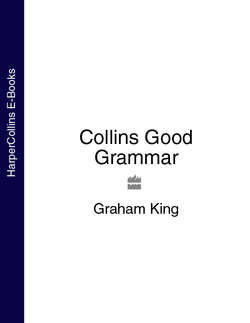Читать книгу Collins Good Grammar - Graham King - Страница 18
Ellipsis: Trimming away ‘Sentence Fat’
ОглавлениеNobody these days wants to write more words than necessary, or to be forced to read fifty words when the information could have been conveyed with half that number. We have already seen that by combining simple sentences into compound and complex sentences we can economise on words and even enhance clarity; but there is another grammatical convention that allows us to trim away words we don’t need. It’s called ellipsis and it works like this:
| WITHOUT ELLIPSIS | When the children were called to the dinner table they came to the dinner table immediately. |
| Harry Green had more coins in his collection than Thomas had coins in his collection. | |
| WITH ELLIPSIS | When the children were called to the dinner table they came immediately. |
| Harry Green had more coins in his collection than Thomas had in his. |
The reason we can get away with omitting part of the structure of sentences is that, if the listener or reader is paying attention, he or she will automatically supply the missing words from the context of what is being said or written. There is no loss of clarity, either; on the contrary, repetitive words can lead to boredom.
We resort to ellipsis constantly in our everyday communicating:
| Leaving already? | means | (Are you) leaving already? |
| See you! | means | (I will) see you (later, tomorrow, etc) |
| Coming? | means | (Are you) coming (with me)? |
Sometimes our economising extends to dropping what were once considered essential words:
He was unceremoniously kicked out the door.
The hat Rita bought is a total disaster.
If we heard these sentences spoken in an informal context we would hardly regard them as ungrammatical as, nowadays, even the strictly grammatical versions look a little odd to our eyes:
He was unceremoniously kicked out of the door.
The hat that Rita bought is a total disaster.
Such sentences are considered informal, although their meanings are perfectly clear. If a hostess greets a guest with, ‘I am delighted that you could come’, isn’t she being a trifle formal? More likely, the greeting would be, ‘I’m delighted you could come!’.
Although omitting that in sentences may now be acceptable, remember that it can sometimes lead to ambiguity. At the other extreme is the multiple that: He pointed out that that that in the sentence was superfluous. What can you do about that?
